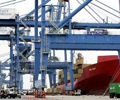MABUX: Bunker Market In High Volatility Mode

High volatility in the bunker market, caused by the ongoing military conflict in Ukraine, prevents the formation of a sustainable trend in fuel indices. Over the Week 15, MABUX Bunker Index showed moderate irregular changes. The 380 HSFO index fell by 5.82 USD: from 718.82 USD/MT to 713.00 USD/MT. The VLSFO index fell more significantly – by 26.09 USD: from 946.57 USD/MT to 920.48 USD/MT. The MGO index, in turn, rose by 18.19 USD (from 1159.26 USD/MT to 1177.45 USD/MT).
The Global Scrubber Spread (SS) weekly average – the price difference between 380 HSFO and VLSFO – began a moderate decline over the week – minus $ 6.81 ($ 215.32 versus $ 222.13 last week). At the same time, in Rotterdam, the average SS Spread, on the contrary, slightly increased from $207.67 to $208.83 (plus $1.16). It is noteworthy, that the sharp decline in 380 HSFO/VLSFO price difference at the port of Singapore continued: the average ratio decreased by $32.67 (from $180.00 to $147.33), and in absolute value the SS Spread fell to $138.00 as of April 13. More information is available in the Price Differences section on mabux.com.
After more than a week of consecutive declines, Europe’s benchmark natural gas prices began to rise again amid lower orders for Russian gas supply transiting Ukraine. Europe is also looking to boost its imports of liquefied natural gas (LNG), and various countries, including major economies dependent on Russian gas such as Italy and Germany, have been in talks with exporters, including the United States and Qatar, for more LNG supply, if possible. LNG as a bunker fuel is still not listed.
Over the Week 15, the average correlation of MABUX MBP Index (market bunker prices) vs MABUX DBP Index (MABUX digital bunker benchmark) showed that all major bunker fuels are in the zone of significant overpricing in all selected ports amid continued high volatility. Thus, 380 HSFO fuel’s overcharge margins at the end of the week were registered as: in Rotterdam – plus $ 69 (plus $ 63 compared to last week), in Singapore – plus $ 98 (plus $ 48), in Fujairah – plus $ 91 (plus $ 51) and in Houston, plus $89 (plus $68). The overcharge levels continued to grow with highs in Singapore – plus 50 points, and in Fujairah – plus 40 points.
VLSFO fuel grade, according to MABUX MBP/DBP Index, was also overpriced in all selected ports: plus $119 (plus $101 last week) in Rotterdam, plus $71 (plus $42) in Singapore, plus $86 (plus $68) in Fujairah and plus $ 127 (plus $106) in Houston. The pace of growth of overcharge margins in the VLSFO segment is significantly behind that of 380 HSFO.
As for MGO LS, MABUX MBP/DBP Index also recorded an overpricing over the week in all four selected ports: Rotterdam – plus $ 80 (plus $ 24 the week before), Singapore – plus $ 30 (minus $ 8), Fujairah – plus $112 (plus $87) and Houston – plus $146 (plus $107). Overcharge ratio in this segment of fuel also continued to grow.
Research carried out by consultancy Blue Insight indicates that in 2021 the practice of short very low sulphur fuel oil (VLSFO) deliveries cost owners and charterers around $100 million in Fujairah and $150 million in Rotterdam. The data collected by Blue Insight suggests that ‘a significant number’ of deliveries in these bunker hubs are being made below financial breakeven, which indicates the continuing practice of delivery shortfalls. Evidence for the report’s conclusions is said to have been provided by input from suppliers, buyers and surveyors in Rotterdam and Fujairah. While the ‘costs’ of short delivery were based on the delivery economics of VLSFO, the research is said to support similar patterns of losses for high sulphur fuel oil (HSFO) and even greater losses for marine gasoil (MGO). According to Blue Insight, the report’s findings should provide impetus for a more widespread use of mass flow meters in bunker deliveries. The Port of Singapore, which for many years was dogged by reputational issues due to the endemic practice of short deliveries, has mandated the use of MFMs with notable success.
The ongoing military conflict in Ukraine maintains high volatility in the global bunker market. It could be hardly expected a stable trend in fuel prices to set up next week. Sharp irregular changes in bunker prices will continue.
Source: By Sergey Ivanov, Director, MABUX

 Hellenic Shipping News Worldwide Hellenic Shipping News Worldwide, Online Daily Newspaper on Hellenic and International Shipping
Hellenic Shipping News Worldwide Hellenic Shipping News Worldwide, Online Daily Newspaper on Hellenic and International Shipping
























 PG-Software
PG-Software